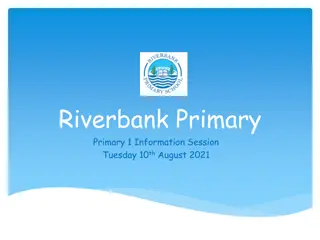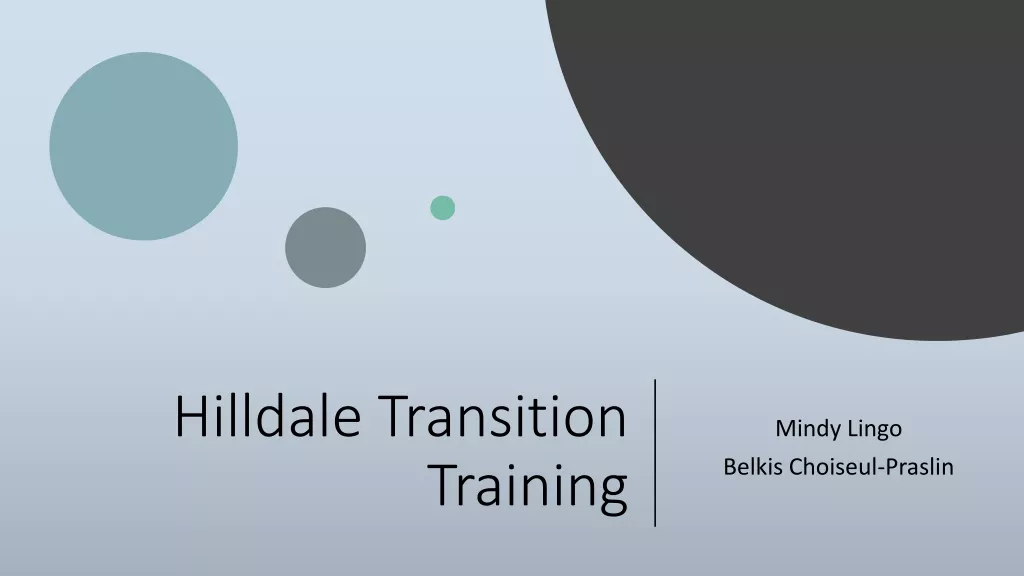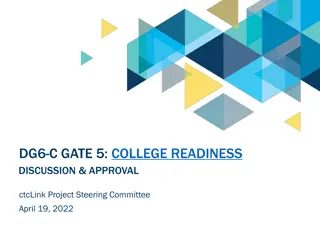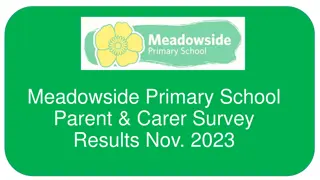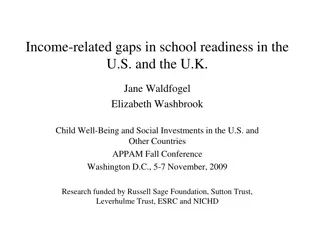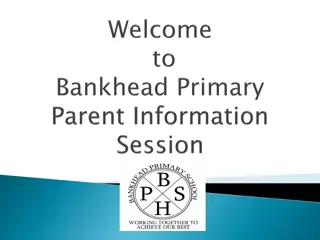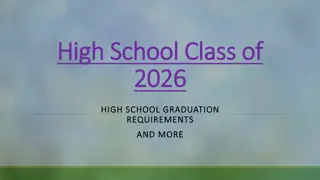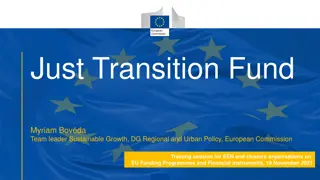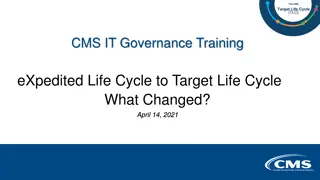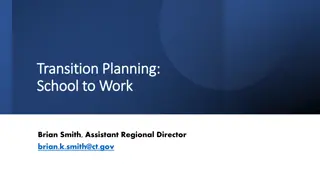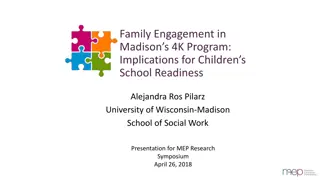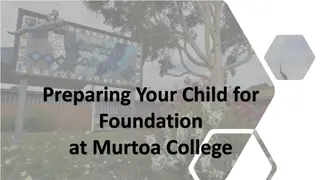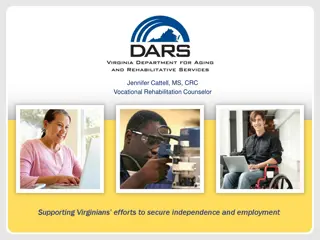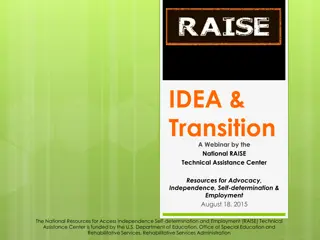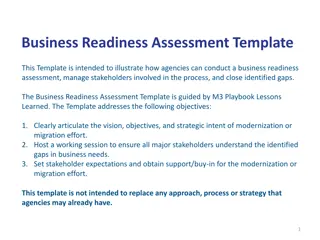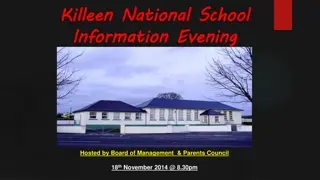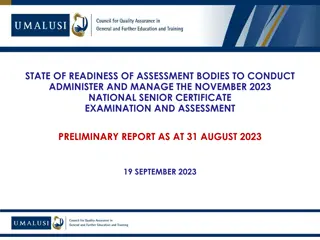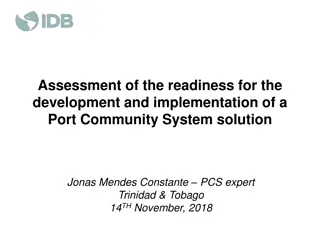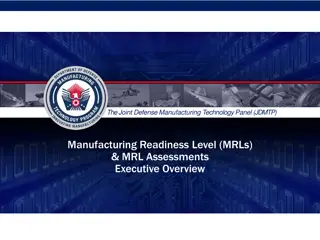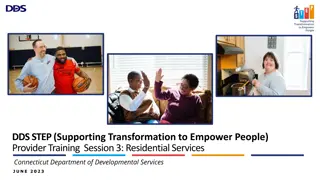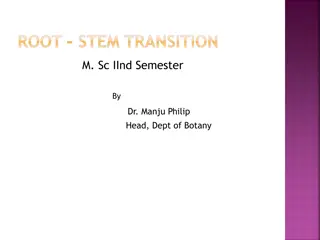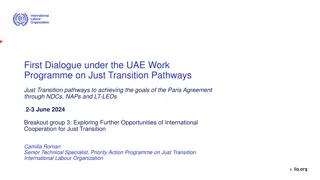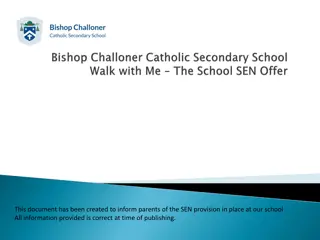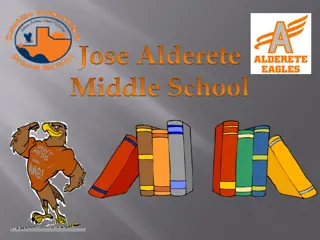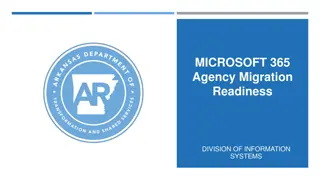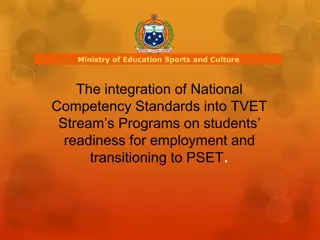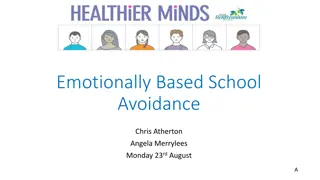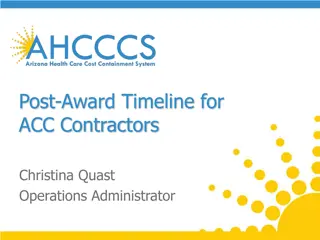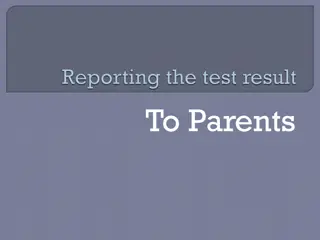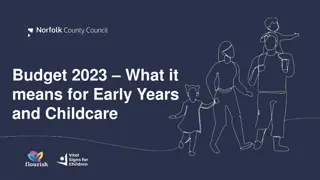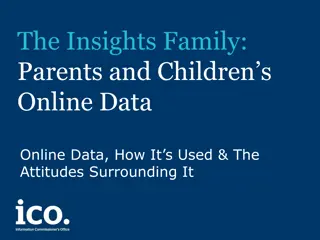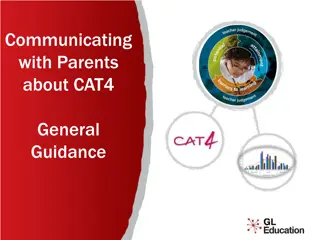School Readiness and Transition Tips for Parents
Explore strategies to support your child's school readiness, focusing on personal, social, and emotional development. Learn how to help your child become independent, resilient, and ready for the transition to school. Discover the key characteristics that contribute to a successful start in Reception class. Gain insights into building stronger relationships between schools and pre-school settings, enhancing parent support networks, and encouraging communication between caregivers and educators.
Download Presentation

Please find below an Image/Link to download the presentation.
The content on the website is provided AS IS for your information and personal use only. It may not be sold, licensed, or shared on other websites without obtaining consent from the author. Download presentation by click this link. If you encounter any issues during the download, it is possible that the publisher has removed the file from their server.
E N D
Presentation Transcript
Preparing for School Eastwick Infant School 22ndMarch 2023
Lighting up Learning Lighting up learning main aims are: to build a stronger relationship between schools and pre-school settings through regular meetings to share good practice in Early Years to provide better opportunities to communicate and share information about children moving up to school to improve the transition from pre-school to school for all children To improve support networks for parents during school transitions
School Readiness School Readiness All settings involved in LUL agree that school readiness is about the characteristics that a child develops that will help them to make a flying start in Reception. A lot of these are to do with the child becoming more independent more resilient and ready to give anything a go. Nursery and pre-school settings will be helping the children moving into school in September by supporting growing independence. Tonight we are going to share some strategies you can try at home to support your child too. We know that as parents you want to do the best for your children and give them the best start to school possible. Tonight we are going to give you some advice which will place your child best for starting school. It is important to remember that tonight's presentation is advice and we understand that each child is a different stage of their development starting school and that each child will have individual needs. If you have individual questions please talk to your child s pre-school.
Prime Areas The 3 prime areas are: Personal, Social and Emotional Development Communication and Language Physical Development The prime areas underpin the specific areas of learning and are a focus when children start school.
Personal, social, emotional What school readiness looks like What you can do Being to understand different emotions and the impact that has on others Name feelings / emotions for your children Give them jobs and responsibilities Being able to communicate what they need Give them opportunities to be independent Separate confidently from their parent or carers Allow mistakes and praise effort Play board games and turn taking games Begin to listen to others without interrupting or talking over other children Have a clear routine in the morning Tolerating delays Letting your child wait a turn Managing either own hygiene e.g. wiping their nose
Communication What school readiness looks like What you can do Being able to communicate how they feel Being able to communicate what they need Begin to listen to others without interrupting or talking over other children Follow a simple instruction Serve and return conversations To focus attention for short periods of time (mins) Knowing some nursery rhymes Engage in imaginative play with your child Having points in the day with no phone or tv Narrating your day Meal times / family meal time Asking questions Playing games like Simon Says Helping with daily life going to the supermarket etc Playing board games Sharing stories Having back and forth conversations during play
Gross Motor Skills What school readiness looks like What you can do Large mark making Go to the park Sitting with their legs crossed Cardboard carpets or large paper Go to the toilet independently and wiping themselves Hopscotch Independent toileting including getting changed Beginning to get changed independently (tights/socks) Practising getting dressed in uniform Independently and effectively wash their hands Practise hand washing techniques and counting Hand up their coat using the hook provided Add a hook to coat
Fine Motor Skills What school readiness looks like What you can do Holding a pencil and being willing to have a go at making marks Praise writing Pegging washing on the line Use a knife and fork to eat Scrunching up paper Drink out of an open cup Practise drinking from an open cup Do up their coat Allow children to have a go at cutting up soft foods independently Working on buttoning Using scissors to snip paper Buy age appropriate scissors Playing with small construction such as Duplo and Lego Allowing children to snip paper
Reading What school readiness looks like What you can do Visiting the local library Reading in front of your children to show that reading can be a passion Reading signs and labels to your children Read to your child every day Read familiar stories so children become familiar with language patterns show children different contexts for reading e.g. recipe books, birthday cards etc. Have a reading routine e.g. bedtime story Talking about pictures Knowing how to hold and open a book Being respectful with books Turning the pages of the story Talking about what they can see in the pictures Knowing the difference between pictures and words Knowing familiar stories and having favourites Being able to join in with repeated refrains from favourite or familiar stories Know the first sound of their name Recognise their name when its written down
Pre-writing Pre-writing skills There is often an assumption that children should be able to write by the time they start school. This is not expected by schools but it is always an advantage if children are happy to pick up a pencil and make meaningful marks for them. If children are writing they should be taught to use lower case letters and encouraged to hold a pencil in a tripod grip. Top tips: Praise writing attempts Use phrases such as tell me about your writing Don t correct spellings If you are model writing use lower case and print letters Mirror writing is developmental don t panic if you see children writing backwards or forming letters backwards. Swapping hands is developmental some children are not ready to have a dominant hand.
Phase 1 phonics Phase 1 aspects: Aspect 1: Environmental sounds Aspect 2: Instrumental sounds Aspect 3: Body Percussion Aspect 4: Rhythm and Rhyme Aspect 5: Alliteration Aspect 6: Voice Sounds Aspect 7: Oral blending and segmenting Phase 1 phonics underpins reading and writing and will help your child to be prepared for phase 2 phonics when they enter school. Hand out s available with suggested activities and top tip for each aspect. We suggest games over workshops let s have a go!
Number and Number Pattern What school readiness looks like Being able to match (recognise something that is the same shape, picture etc) What you can do Spot and talk about numbers in the environment e.g. house numbers, car reg plate, when cooking, measuring feet for new shoes Being able to sort objects different ways (by colour, by size, by shape) Play puzzles and matching games Play spot the difference Being able to compare and talk about difference and similarities Sing nursery rhymes which include numbers and number patterns Being able to order, put items into an order so they are counted one and only once Count actions, going up the stairs, buttons on your coat Understand words such as first, last and next Play games that involve counting e.g. snakes and ladders, board games, counting socks in the washing. Understand use positional words such as behind, in front, below, beside etc Having an understand that you start counting zero When counting start at zero Dice games and dominos Counting objects as part of daily routine e.g. can you get me 4 forks for the dinner table?
Top Tips Name everything even socks! Be positive and talk about school in a positive light Read books about starting school Packing school bag with your child Buying coat and wellies with your child Show your child which items are there s and how to spot their name If your child is having a packed lunch talk about what is in their lunch and which items they should eat first (check school requirements on food) put finished lunch back into the lunch box Show your child how to blow their nose and dispose of the tissue in the bin Practising the route to school Take part in transition opportunities from your school Take part in tidying up




